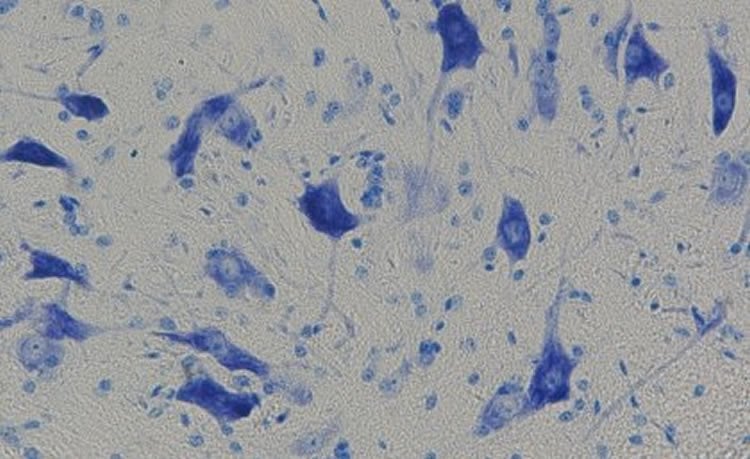Summary: Researchers have discovered a potential treatment that may help delay motor neuron loss in ALS.
Source: University of Queensland.
University of Queensland researchers have identified a potential treatment to delay motor neuron loss and symptoms in the inevitably fatal motor neuron disease (MND).
School of Biomedical Sciences researcher Dr Karin Borges said triheptanoin, a synthetic triglyceride oil, might help to address problems with energy metabolism associated with the neurodegenerative disease.
“MND is characterised by degeneration of motor neurons in the brain and spinal cord which leads to muscle weakness, paralysis and death, usually due to respiratory failure,” Dr Borges said.
“There is evidence showing the disease interrupts the process providing the primary cellular energy source necessary for cell function and survival.”
Dr Borges’ research tested if giving oral triheptanoin could prevent cell death and symptom onset in an animal model of MND.
“We found that motor neuron loss was reduced by a third and loss of limb strength and body weight were delayed,” she said.
“Our data showed an improvement in disease symptoms when treatment was initiated prior to their onset.
“This raises hope that triheptanoin may be able to preserve motor neuron and muscle function when treatment is started at an early stage of the disease.
“Given the difficulty in diagnosing MND, more research is needed to determine whether the treatment could be effective when a patient already has obvious muscle or neuron impairment.”
Triheptanoin is an investigational medicine being developed by Ultragenyx Pharmaceuticals for patients with fatty-acid metabolism disorders and Glucose Transporter Type 1 Deficiency Syndrome, which leads to epileptic seizures in young children.
Triheptanoin has been shown to be well-tolerated in early stage clinical trials.

Dr Borges said a third of people with MND lost weight rapidly, and those with a higher body mass index (BMI) survived longer than those with a lower BMI.
“One of the interesting properties of triheptanoin is that it helps the body to extract more energy from normal food, as well as providing additional fuel.”
“This could be very important for patients with this rapidly progressive disease.”
There is no cure for MND, which is also known as Amyotrophic Lateral Sclerosis (ALS).
Source: Karin Borges – University of Queensland
Image Source: NeuroscienceNews.com image is adapted from the University of Queensland press release.
Original Research: Full open access research for “Triheptanoin Protects Motor Neurons and Delays the Onset of Motor Symptoms in a Mouse Model of Amyotrophic Lateral Sclerosis” by Tesfaye W. Tefera, Yide Wong, Mallory E. Barkl-Luke, Shyuan T. Ngo, Nicola K. Thomas, Tanya S. McDonald, Karin Borges in PLOS ONE. Published online August 26 2016 doi:10.1371/journal.pone.0161816
[cbtabs][cbtab title=”MLA”]University of Queensland. “Delaying Motor Neuron Loss.” NeuroscienceNews. NeuroscienceNews, 16 September 2016.
<https://neurosciencenews.com/motor-neuron-loss-delay-5062/>.[/cbtab][cbtab title=”APA”]University of Queensland. (2016, September 16). Delaying Motor Neuron Loss. NeuroscienceNews. Retrieved September 16, 2016 from https://neurosciencenews.com/motor-neuron-loss-delay-5062/[/cbtab][cbtab title=”Chicago”]University of Queensland. “Delaying Motor Neuron Loss.” https://neurosciencenews.com/motor-neuron-loss-delay-5062/ (accessed September 16, 2016).[/cbtab][/cbtabs]
Abstract
Triheptanoin Protects Motor Neurons and Delays the Onset of Motor Symptoms in a Mouse Model of Amyotrophic Lateral Sclerosis
There is increasing evidence that energy metabolism is disturbed in Amyotrophic Lateral Sclerosis (ALS) patients and animal models. Treatment with triheptanoin, the triglyceride of heptanoate, is a promising approach to provide alternative fuel to improve oxidative phosphorylation and aid ATP generation. Heptanoate can be metabolized to propionyl-CoA, which after carboxylation can produce succinyl-CoA and thereby re-fill the tricarboxylic acid (TCA) cycle (anaplerosis). Here we tested the hypothesis that treatment with triheptanoin prevents motor neuron loss and delays the onset of disease symptoms in female mice overexpressing the mutant human SOD1G93A (hSOD1G93A) gene. When oral triheptanoin (35% of caloric content) was initiated at P35, motor neuron loss at 70 days of age was attenuated by 33%. In untreated hSOD1G93A mice, the loss of hind limb grip strength began at 16.7 weeks. Triheptanoin maintained hind limb grip strength for 2.8 weeks longer (p<0.01). Loss of balance on the rotarod and reduction of body weight were delayed by 13 and 11 days respectively (both p<0.01). Improved motor function occurred in parallel with alterations in the expression of genes associated with muscle metabolism. In gastrocnemius muscles, the mRNA levels of pyruvate, 2-oxoglutarate and succinate dehydrogenases and methyl-malonyl mutase were reduced by 24–33% in 10 week old hSOD1G93A mice when compared to wild-type mice, suggesting that TCA cycling in skeletal muscle may be slowed in this ALS mouse model at a stage when muscle strength is still normal. At 25 weeks of age, mRNA levels of succinate dehydrogenases, glutamic pyruvic transaminase 2 and the propionyl carboxylase β subunit were reduced by 69–84% in control, but not in triheptanoin treated hSOD1G93A animals. Taken together, our results suggest that triheptanoin slows motor neuron loss and the onset of motor symptoms in ALS mice by improving TCA cycling.
“Triheptanoin Protects Motor Neurons and Delays the Onset of Motor Symptoms in a Mouse Model of Amyotrophic Lateral Sclerosis” by Tesfaye W. Tefera, Yide Wong, Mallory E. Barkl-Luke, Shyuan T. Ngo, Nicola K. Thomas, Tanya S. McDonald, Karin Borges in PLOS ONE. Published online August 26 2016 doi:10.1371/journal.pone.0161816






